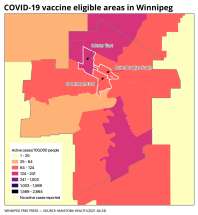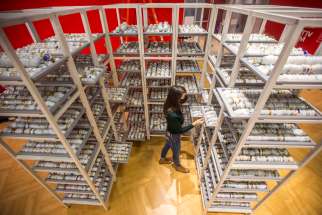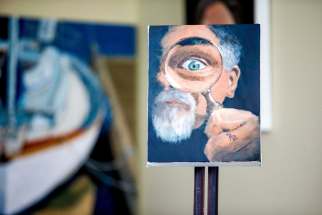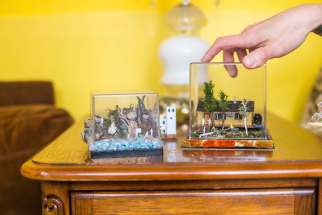House of unCommons Participating in Canada's democracy has been turned inside out over the past 13 months; three Manitoba MPs reflect on the limitations of virtual technology on their jobs
Read this article for free:
or
Already have an account? Log in here »
To continue reading, please subscribe:
Monthly Digital Subscription
$0 for the first 4 weeks*
- Enjoy unlimited reading on winnipegfreepress.com
- Read the E-Edition, our digital replica newspaper
- Access News Break, our award-winning app
- Play interactive puzzles
*No charge for 4 weeks then price increases to the regular rate of $19.00 plus GST every four weeks. Offer available to new and qualified returning subscribers only. Cancel any time.
Monthly Digital Subscription
$4.75/week*
- Enjoy unlimited reading on winnipegfreepress.com
- Read the E-Edition, our digital replica newspaper
- Access News Break, our award-winning app
- Play interactive puzzles
*Billed as $19 plus GST every four weeks. Cancel any time.
To continue reading, please subscribe:
Add Free Press access to your Brandon Sun subscription for only an additional
$1 for the first 4 weeks*
*Your next subscription payment will increase by $1.00 and you will be charged $16.99 plus GST for four weeks. After four weeks, your payment will increase to $23.99 plus GST every four weeks.
Read unlimited articles for free today:
or
Already have an account? Log in here »
Hey there, time traveller!
This article was published 23/04/2021 (1696 days ago), so information in it may no longer be current.
OTTAWA — Last September, Elmwood-Transcona MP Daniel Blaikie ended the lease on his Ottawa apartment, closed the hatch of his family’s minivan and drove 2,140-kilometres back to Winnipeg.
“I felt that was the best practice, in terms of protecting my community,” says the NDP MP, who had previously flown home most weekends since his 2015 election.
Like most Canadians, the COVID-19 pandemic has drastically altered how members of Parliament do their job.
For months, the House of Commons has run on a skeleton crew consisting mostly of MPs who live within driving distance of Parliament Hill.
The chamber has tried to include representation from ridings outside Ontario and Quebec through a virtual system where MPs speak through Zoom and vote on legislation with their smartphone.
But it’s been no replacement for the informal conversations and pugnacious exchanges that form the basis of governing a federation with stark regional differences.
“There’s not a lot from the virtual Parliament that I would really care to retain,” Blaikie says.
As vaccines roll out, MPs will have to decide on which, if any, changes to keep; the results have the potential to permanently reshape Canadian democracy.
Going digital
The people of Kildonan-St. Paul elected MP Raquel Dancho in late 2019, at age 29. The Conservative party released a spiffy ad showcasing her as one of the young women in its ranks, showing her walking on to Parliament Hill.
In the video, she mused about sitting in the Commons on behalf of nearly 100,000 Manitobans and questioning the ministers directly.
But she had only a few opportunities to do so before COVID-19 turned Parliament into a mostly virtual affair last spring.
The shift wasn’t pretty.

At first, participation in the Commons included only MPs living in the National Capital Region, others from elsewhere who chose to stay put there and a small handful daring to fly amid growing uncertainty about spread of the coronavirus.
By May, screens were installed in the Commons so MPs could participate in a hybrid model of government; some were on the House floor, others appeared from their offices, vehicles and backyards.
It took MPs a while to get used to the new normal, including adhering to parliamentary rules on Zoom and speaking slow enough for bilingual interpretation.
The Speaker has cracked down on MPs with wacky webcam backgrounds and those not dressed in appropriate parliamentary attire. But the Zoom exchanges still lack the impact of the real thing, Dancho says.
“There is something to be said for standing across the aisle from someone. You’re a couple metres away from them, and you’re looking them in the eye as you’re criticizing them, which is our job
“There is something to be said for standing across the aisle from someone. You’re a couple metres away from them, and you’re looking them in the eye as you’re criticizing them, which is our job,” she says.
“That’s much more powerful and in line with how our Westminster democracy was set up.”
The Conservatives have been the most hesitant to go fully virtual, arguing that their western and rural base will be marginalized if MPs can be seen only on digital screens that are easily ignored in the Commons.
“It takes a way a lot of the integrity and accountability of the process,” Dancho says.
Virtual voting
Before the pandemic, a standard vote normally took about 10 minutes, with a roll call of all 338 MPs standing at their House desks.
But on Zoom it took up to an hour, with the Speaker calling upon each MP, and ensuring they could be seen and heard answering whether they supported a given motion. MPs had to remain visible on camera for the entire vote.
A year into the pandemic, last month Parliament rolled out a smartphone app that allows MPs to vote on legislation using facial-recognition software to lower the risk of hackers infiltrating the process.

However, the new platform removes some tools from the hands of the opposition parties.
Delay is one of the key tactics for opposition MPs to register their unhappiness with the government, particularly in a minority context.
Refusing to consider one party’s amendments can result in their MPs delaying debates and talking out the clock.
In the most extreme circumstances, opposition parties can orchestrate marathon, overnight voting sessions, such as the 30-hour filibuster triggered in response to the Liberals withholding information about the SNC-Lavalin scandal.
“It’s very much in the interest of the government that this (using the voting app) continues; it’s fully in their favour, to the detriment of opposition parties.”
Parties can also call votes that aren’t really necessary, such as agreeing to proceed with the day’s agenda. Doing so forces a 30-minute countdown for MPs to get out of their Hill offices, or cut off witness testimony, shuffle into the West Block and sit down in the Commons.
None of that is possible with a voting app where MPs can push a button from anywhere with an internet connection.
“It’s very much in the interest of the government that this continues; it’s fully in their favour, to the detriment of opposition parties,” Dancho says.
A solitary job
Winnipeg North MP Kevin Lamoureux has logged the most speeches in Parliament of any MP since his party formed government in 2015.
“I love the passion of debate inside the chamber,” says Lamoureux, who pines for a well-executed heckle in the ornate Commons chamber.
Now, he takes small comfort in being allowed more than just water at his desk. “I’ve been able to drink Coke Zero, as I’m on virtual.”
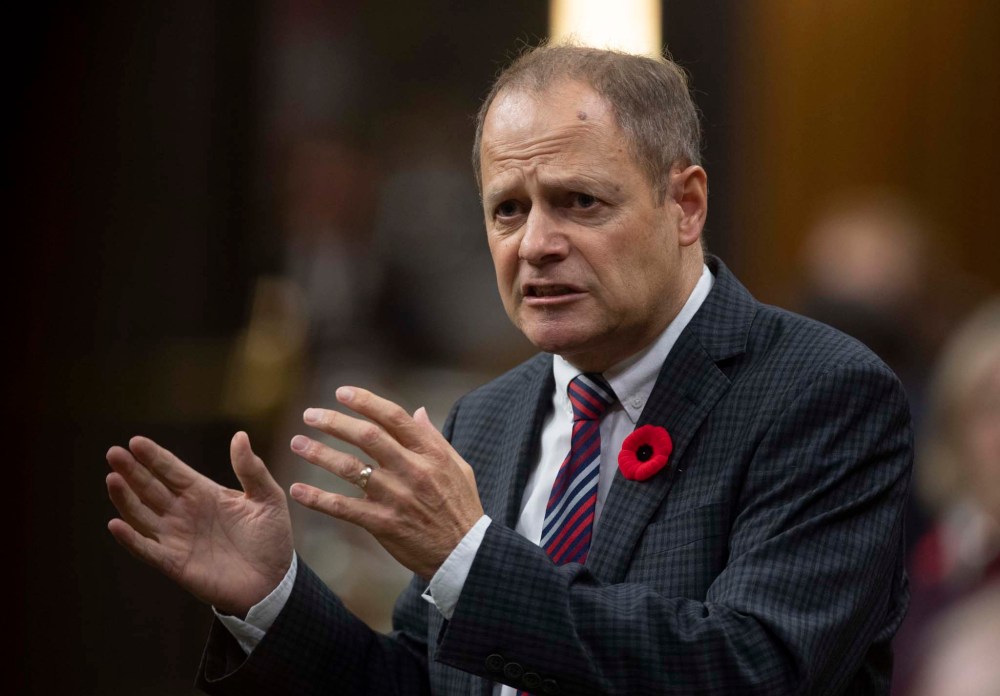
Many MPs say they miss fleeting exchanges with colleagues from other parties.
A lot of the horse-trading occurs outside formal meetings, when MPs cross paths in the hallways outside the Commons, on breaks during committee meetings and particularly in Parliament Hill cafeterias.
“There are all sorts of relationships that are built, and those relationships are absolutely critical in terms of the functionality of Parliament in a very real sense,” Lamoureux says.
Blaikie agrees.
“One of the challenges is just how isolating it is.”
“It’s not just the bickering you see in question periods,” he says. “You’re trying to negotiate a path forward, sometimes with people you don’t agree on a lot of things with.”
The camaraderie extends to the chaotic airport shuffle, when scores of MPs try to make it onto Thursday-evening flights home to their constituencies and then back to Ottawa early Monday.
Now, Blaikie mostly encounters MPs on Zoom while sitting in front of a white bed sheet.
“One of the challenges is just how isolating it is,” he says.
A pared-down Parliament
The non-partisan Samara Centre for Democracy in Toronto surveyed MPs last spring about how Parliament should function. The organization found common ground on two principles: MPs must be able to vote remotely, and have an equal shot at representing their constituents.
Samara’s research manager, Adelina Petit-Vouriot, says the changes in Ottawa largely reflect those demands.

“This is a stop-gap measure, factoring in a pandemic emergency, in order to make it possible for MPs to do their jobs as best as they can, and respect the fundamental pillars of democracy, which are scrutiny and representation,” says Petit-Vouriot, a former Winnipegger.
“A virtual Parliament cannot replace the spontaneity… but it’s our best bet for sustaining core, democratic functions.”
A compromise MPs reached involved five-minute blocks for questioning MPs, leading to more detailed answers than the focus on soundbites during question period.
“I’ve seen members from all over the country, including in Western Canada, interrogate ministers quite vigorously through the virtual-Parliament format,” Blaikie says.
“You can tell that ministers are finding answering those questions quite uncomfortable.”
But it’s far from perfect.
“I’ve seen members from all over the country, including in Western Canada, interrogate ministers quite vigorously through the virtual-Parliament format.”
Parliamentary interpreters keep burning out, because of constant interruptions and connectivity issues on Zoom. Their union says hearing loss, headaches and an inability to focus have led to a sharp rise in workplace-injury claims.
House committees have thus constrained almost all their work to responding to the pandemic.
The Senate has similarly suspended almost any study of broader issues impacting minorities or different regions, limiting its work to whatever legislation the House passes.
Yet Petit-Vouriot notes that committees are not used to having guests testify through video links, which was generally only done a few times a year before the pandemic.
To Blaikie, the WE Charity scandal is evidence that accountability is alive and well in the Commons. Committee questioning yielded unflattering answers that led the former finance minister to resign and the Liberals to prorogue Parliament.
“Had we not had the virtual Parliament, I think Bill Morneau would still be finance minister today,” he says.
Fear of flying
Given all of the issues, MPs are itching to get back on the Hill.
From May to December, Dancho flew to Ottawa roughly once a month until COVID-19 case counts began to climb again in Ottawa and Winnipeg.
MPs are exempt from Manitoba’s interprovincial quarantine rules, but Dancho says they’re also role models, which makes things more difficult now, as more infectious variants take hold.
“It created a lot of anxiety,” she says. “Yes, I’m allowed to go the grocery store, because I’m exempted, but what if I have something and I don’t know, and I’m spreading it to my community and to the elderly?
“That was a lot of pressure.”
Dancho says she doesn’t plan to visit an international airport until at least the most vulnerable Manitobans are all fully vaccinated. That group includes her ailing grandfather.
“Coming off an airplane and seeing him would just be a no-go, and he’s not going to be around for very long,” she says.
As the pandemic rages on, Blaikie says changes could be made now to make Parliament more effective.
He’s pushed in vain for the Commons sit in weeks-long shifts, similar to what the construction industry calls a wrap, followed by break weeks so that people could fly home and self-isolate.
Currently, MPs’ flights and Ottawa apartments are paid for by the taxpayer, but they can’t divert the money they’re now saving to pay for self-isolation in hotels.
“This is a conversation that, as far as I can tell, is not happening in any significant way,” Blaikie says.
Seizing the moment
As vaccines roll out, MPs are wondering what their jobs will look like in the fall.
Dancho and Petit-Vouriot both agree that Parliament should consider allowing MPs to participate virtually for specific safety reasons, such as recovering in hospital, nursing a newborn or being grounded in a winter storm.
That would prevent situations such as the one that occurred in 2005, when terminally ill independent MP Chuck Cadman flew from B.C. to Ottawa to cast a tie vote that prevented the Liberal government from falling.
“That just seems ridiculous to me, now that we’ve proven that we have the technology to be more compassionate,” Dancho says, adding that implementing accommodations for new mothers would also help convince more young women to run for office.
But beyond tweaks to improve the functioning of Canada’s democracy, Blaikie, Dancho and Lamoureux all say they don’t want to see the Commons’ current model become a permanent one.
In February, a Quebec senator argued that carbon emissions alone mean MPs and senators should avoid flying around so much.
“I hope what sticks is a greater willingness from Parliament to experiment and to try new things and innovate, to use modern technologies.”
Sen. Rosa Galvez roiled Winnipeg MPs by commissioning the Parliamentary Budget Officer to study what would happen if the hybrid system of virtual and in-person attendees became a fixture.
In one year, it would save $6.2 million and nearly 3,000 tonnes of greenhouse gases.
And cause serious regional grievances.
“I just don’t think that would be a valid argument, to diminish the importance of Parliament,” says Lamoureux, arguing the Hill is where policy can be set to much more deeply reduce carbon emissions.
But he argues MPs far outside Ottawa should have more flexibility to stay in their ridings and participate virtually, particularly when they’re newly elected or when their constituency is dealing with a major crisis.
“There’s a window here that we might be able to take advantage of,” he says.
Petit-Vouriot says things might end up being more accessible after COVID-19.
“I hope what sticks is a greater willingness from Parliament to experiment and to try new things and innovate, to use modern technologies,” she says.
But she realizes politicians aren’t used to seeing eye to eye.
“I suspect it will be an uphill battle to get everybody on board,” she says.
dylan.robertson@freepress.mb.ca
History
Updated on Saturday, April 24, 2021 1:08 PM CDT: Corrects Adelina Petit-Vouriot's title.



